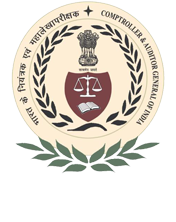Audit Reports

Nagaland
Report of 2011 - Performance Audit on Public Distribution System of Government of Nagaland
Overview
Government of India in order to strengthen the Public Distribution System in India introduced (June 1997) the Targeted Public Distribution System (TPDS) to provide foodgrains to rural poor at subsidised prices by issuing special cards to families Below Poverty Line (BPL). Under the TPDS, the States were required to formulate and implement foolproof arrangements for identification of the poor, delivery of foodgrains to Fair Price Shops (FPS) in a transparent and accountable manner at the FPS level to enhance the food security for the poor. Antyodaya Anna Yojana (AAY) launched in December 2000 was a part of TPDS which focused on the poorest of the poor to provide more substantial benefit and nutrition to reduce hunger among the poorest segment of the BPL population through issue of distinctive ration cards.
The Performance review on the Public Distribution System in Nagaland was undertaken to review the systems adopted by the Department and the efforts of the State Government to bridge the gap in distribution, to highlight the deficiencies and issues of public concern which remained unaddressed and to recommend remedial measures to enable achievement of the essence and objectives of public distribution system. This performance audit also covered Wheat Based Nutrition Programme, Nutritional Programme for Adolescent Girls implemented by the Department of Women Development and the Mid-Day Meal scheme implemented by the Department of School Education.
The State Government did not conduct any baseline survey for identification of beneficiaries but relied on the identification of BPL families as provided by the Union Ministry of Rural Development. The Department also did not carry out periodical revision of beneficiary list for addition/deletion of eligible/ineligible beneficiaries. As a result, 41 per cent of the households in the State remained outside the PDS since 2005. As the Department failed to comply with the scheme guidelines, eligible beneficiaries were deprived of benefits whereas ineligible beneficiaries continued to enjoy the benefits for years together.
Download Audit Report
-
Report of 2011 - Full Report
 (28.80 MB)
Download
(28.80 MB)
Download
-
Index
 (0.16 MB)
Download
(0.16 MB)
Download
-
Glossary of Abbreviations
 (0.23 MB)
Download
(0.23 MB)
Download
-
Preface
 (0.10 MB)
Download
(0.10 MB)
Download
-
Executive Summary
 (0.97 MB)
Download
(0.97 MB)
Download
-
Chapter 1 - Introduction
 (0.94 MB)
Download
(0.94 MB)
Download
-
Chapter 2 - Framework of Audit
 (1.29 MB)
Download
(1.29 MB)
Download
-
Chapter 3 - Financial Management
 (0.73 MB)
Download
(0.73 MB)
Download
-
Chapter 4 - Identification of targeted Beneficiaries
 (1.43 MB)
Download
(1.43 MB)
Download
-
Chapter 5 - Ratio Cards
 (1.43 MB)
Download
(1.43 MB)
Download
-
Chapter 6 - Fair Price Shops
 (2.69 MB)
Download
(2.69 MB)
Download
-
Chapter 7 - Allotment, Lifting and Distribution
 (7.52 MB)
Download
(7.52 MB)
Download
-
Chapter 8 - Storage
 (1.19 MB)
Download
(1.19 MB)
Download
-
Chapter 9 - Convergence Schemes
 (6.30 MB)
Download
(6.30 MB)
Download
-
Chapter 10 - Transportation
 (0.78 MB)
Download
(0.78 MB)
Download
-
Chapter 11 - Quality Control and Quantitative Discrepancies
 (0.91 MB)
Download
(0.91 MB)
Download
-
Chapter 12 - Audit Survey
 (0.71 MB)
Download
(0.71 MB)
Download
-
Chapter 13 - Monitoring Mechanism
 (0.66 MB)
Download
(0.66 MB)
Download
-
Chapter 14 - Conclusion
 (0.28 MB)
Download
(0.28 MB)
Download
-
Appendices
 (0.63 MB)
Download
(0.63 MB)
Download

